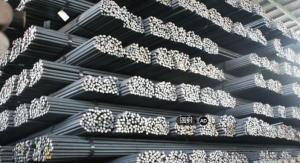Wholesale Round Bar Steel Cr12 Tool Steel 1.2080 Die Steel
- Loading Port:
- Shanghai
- Payment Terms:
- TT OR LC
- Min Order Qty:
- 3 m.t.
- Supply Capability:
- 100000 m.t./month
OKorder Service Pledge
OKorder Financial Service
You Might Also Like
Item specifice
Wholesale Round Bar Steel Cr12 Tool Steel 1.2080 Die Steel
Details Information of Wholesale Round Bar Steel Cr12 Tool Steel 1.2080 Die Steel
| Name | Round Bar Steel Cr12 Tool Steel 1.2080 Die Steel |
| Shape | Round Bar/Square Bar/Flat Bar/Plate/Wire |
| Standard | GB/ASTM/SAE/AISI/DIN/JIS/EN/BS |
| Surface Treatment: | Black/Peeling/Polished/Machined |
| Delivery Condition: | Hot Rolled or Forged/Peeled or Black Surface |
| Test | SGS/UT 100% Elements Testing |
| Certificate: | ISO/Mill Certificate |
| Service: | 24 hours online service / |
| more than 20 years trading and manufacture | |
| Quality Assurance: | the third party inspection, such as SGS, BV, TUV…etc. is acceptable |
| Packaging Details: | Seaworthy Packaging or as per customer's packing instruction |
| Carbon structure round bar | Q195 Q235A Q235B 10# 20#-55# S45CB |
| Low alloy high strength round bar | Q345A/Q345C/Q345D Q345B Q345E |
| Alloy structure round bar | SAE51B20 20Cr 40Cr 40CrV 20CrMo/30CrMo/35CrMo/42CrMo 20CrMoA/30CrMoA/35CrMoA/42CrMoA/42Cr ML20CrMo/ML30CrMo/ML35CrMo/ML42CrMo B7/SCM435-440 20MnTiB 20CrMnMo 20CrMoH 42CrMoH 40MnB/40MnBH 30Mn2-40Mn2 27SiMn 50CrVA 30CrMnTi |
| Pinion steel | 20CrMnTi 20CrMnTiH 20CrMnTiHCS/20CrMnTiHLD Q20CrMnTi-1/Q20CrMnTi-2 |
| Sucker rod | 20-35CrMoA |
| Free-cutting steel | GT1215S |
| Spring steel | 60Si2MnA 65Mn |
| Ball bearing steel | GCr15 |
Chemical Composition of Wholesale Round Bar Steel Cr12 Tool Steel 1.2080 Die Steel
| C | Si | Mn | P | S | Cr | Ni | Cu |
| 0.17-0.24 | 0.17-0.37 | 0.35-0.65 | ≤0.035 | ≤0.035 | ≤0.25 | ≤0.25 | ≤0.25 |
| Tensile strength (σb/MPa) | Yield strength (σb/MPa) | Elongation (δ5/%) |
| ≥410(42) | ≥245(25) | ≥25 |
Company Introduction of Wholesale Round Bar Steel Cr12 Tool Steel 1.2080 Die Steel
CNBM International Corporation is the most import and export platform of CNBM group(China National Building Material Group Corporation) ,which is a state-owned enterprise, ranked in 270th of Fortune Global 500 in 2015.
With its advantages, CNBM International are mainly concentrate on Cement, Glass, Iron and Steel, Ceramics industries and devotes herself for supplying high quality series of refractories as well as technical consultancies and logistics solution.
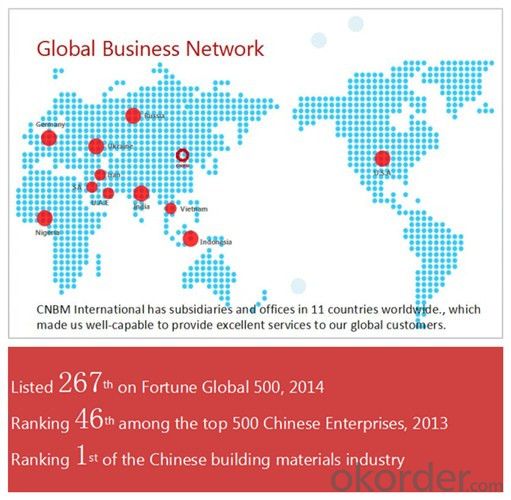
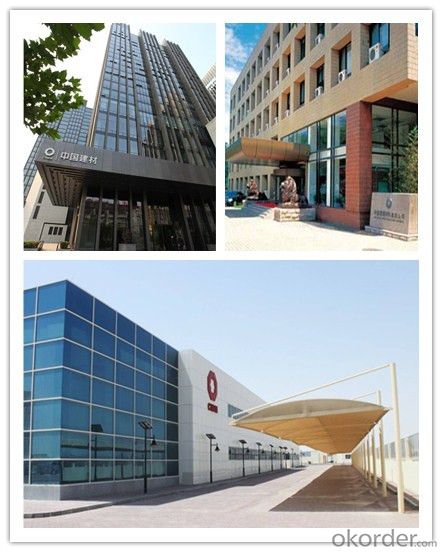
Certificates of Wholesale Round Bar Steel Cr12 Tool Steel 1.2080 Die Steel
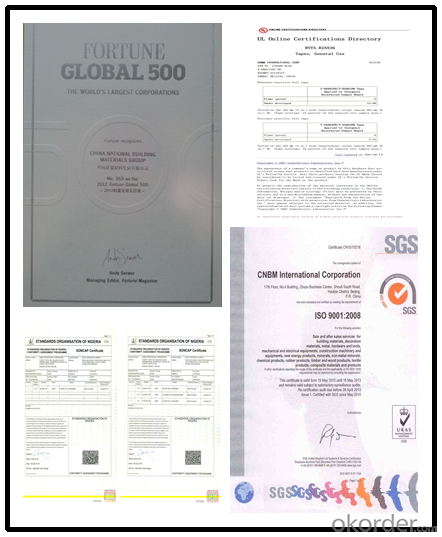
Packaging & Delivery of Wholesale Round Bar Steel Cr12 Tool Steel 1.2080 Die Steel
Packaging Detail | Sea worthy packing /as per customer's packing instruction |
Delivery Detail | 15 ~ 40 days after receiving the deposit |
Products show of Wholesale Round Bar Steel Cr12 Tool Steel 1.2080 Die Steel
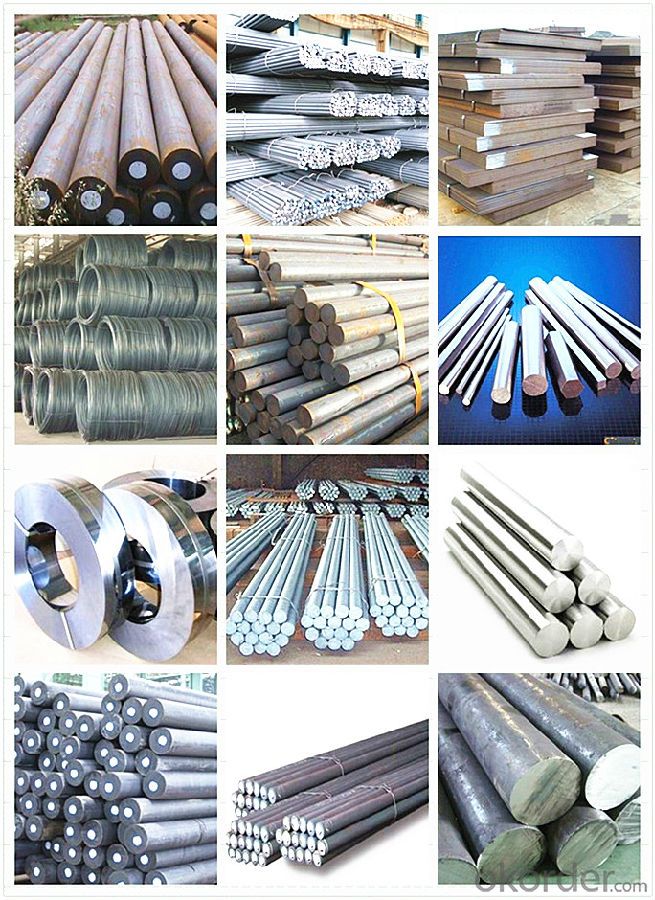
FAQ
Are you a trading company or manufacturer? | Manufacturer |
What’s the MOQ? | 3 metric ton |
What’s your delivery time? | 15-35 days after downpayment received |
Do you Accept OEM service? | Yes |
what’s your delivery terms? | FOB/CFR/CIF |
What's the Payment Terms? | 30% as deposit,70% before shipment by T/T |
Western Union acceptable for small amount. | |
L/C acceptable for large amount. | |
Scrow ,Paybal,Alipay are also ok | |
Why choose us? | Chose happens because of quality, then price, We can give you both. Additionally, we can also offer professional products inquiry, products knowledge train (for agents), smooth goods delivery, excellent customer solution proposals. |
What's your available port of Shipment? | Main Port, China |
What’s your featured services? | Our service formula: good quality+ good price+ good service=customer's trust
|
Where are your Market? | Covering more than 160 countries in the world |
- Q:What are the different high-pressure grades of special steel?
- There are several different high-pressure grades of special steel, each with its own unique properties and applications. Some of the commonly used high-pressure grades of special steel include: 1. 4130 steel: This grade of steel is known for its excellent strength, toughness, and heat resistance. It is often used in the manufacturing of high-pressure tubing and components for the oil and gas industry. 2. 4340 steel: This grade of steel is known for its exceptional strength and toughness. It is commonly used in the production of high-pressure valves, gears, and other critical components in industries like aerospace, defense, and automotive. 3. 316 stainless steel: This grade of stainless steel is highly corrosion-resistant and has excellent high-temperature properties. It is frequently used in high-pressure applications such as pipelines, heat exchangers, and pressure vessels in chemical and petrochemical industries. 4. 17-4 PH stainless steel: This grade of stainless steel offers a combination of high strength, excellent corrosion resistance, and good toughness. It is often used in high-pressure pump components, turbine blades, and other critical parts in industries like power generation and aerospace. 5. F22 steel: This grade of steel is a low-alloy steel with high-temperature strength and excellent creep resistance. It is commonly used in high-pressure and high-temperature applications such as boilers, pressure vessels, and piping systems in power plants and refineries. These are just a few examples of the high-pressure grades of special steel available. The selection of the appropriate grade depends on the specific requirements of the application, including factors like pressure, temperature, corrosion resistance, and mechanical properties.
- Q:What are the limitations of using special steel in electrical applications?
- Using special steel in electrical applications comes with several limitations. Firstly, it tends to be more expensive compared to other commonly used materials like copper or aluminum, making it less cost-effective for large-scale projects. Another drawback is its relatively high electrical resistivity, which hampers its efficiency in conducting electricity. This results in higher energy losses and lower overall efficiency in electrical systems, which is particularly concerning for energy-efficient applications like power generation or transmission. Moreover, special steel lacks the malleability and ductility found in materials like copper, making it less suitable for applications requiring shaping or forming. Working with it can be more challenging and may necessitate complex manufacturing processes. Furthermore, special steel is more susceptible to corrosion compared to materials like copper or aluminum. In environments with high humidity or moisture exposure, this can significantly limit its use in electrical applications. Corrosion not only degrades the steel's electrical properties but also reduces its lifespan, leading to increased maintenance and replacement costs. Lastly, special steel may not be as readily available or easily sourced as other materials commonly used in electrical applications. This can present challenges in terms of availability, lead times, and potential disruptions in the supply chain, ultimately impacting project timelines and overall productivity.
- Q:What are the environmental considerations of using special steel?
- Special steel production has significant environmental considerations. The extraction and processing of raw materials, such as iron and coal, contribute to deforestation, habitat destruction, and greenhouse gas emissions. Moreover, the high energy requirements during steel production result in carbon dioxide emissions, contributing to climate change. Special steel also often requires the use of alloying elements, such as chromium and nickel, which can lead to toxic waste and pollution if not properly managed. Therefore, careful monitoring and implementation of sustainable practices are crucial to minimize the environmental impact associated with using special steel.
- Q:How does special steel perform in low-temperature applications?
- Special steel performs well in low-temperature applications due to its unique properties such as high strength, toughness, and resistance to brittleness. It retains its mechanical properties even at extremely cold temperatures, making it ideal for industries like aerospace, automotive, and energy where materials need to withstand challenging environments.
- Q:How does tool steel maintain its hardness at high temperatures?
- Tool steel maintains its hardness at high temperatures due to its high carbon content and alloying elements. The high carbon content allows for the formation of carbides, which are extremely hard and stable even at elevated temperatures. Additionally, the alloying elements in tool steel, such as chromium, tungsten, and molybdenum, form secondary carbides that further enhance the steel's hardness and heat resistance. These carbides act as strengthening agents, preventing the steel from losing its hardness and maintaining its performance even under high-temperature conditions.
- Q:What are the main factors affecting the machinability of special steel?
- The machinability of special steel, which refers to its ability to be easily cut, shaped, and formed, is influenced by several key factors. 1. Alloy Composition: The chemical composition of special steel plays a crucial role in its machinability. Elements such as carbon, chromium, nickel, and molybdenum can significantly affect the material's hardness, toughness, and cutting properties. Higher carbon content, for example, can increase the hardness of steel, making it more difficult to machine. 2. Hardness: The hardness of special steel is a critical factor in determining its machinability. Harder steels require more cutting force and generate more heat during machining, which can lead to increased tool wear and reduced efficiency. Softer steels, on the other hand, are generally easier to machine but may result in lower tool life. 3. Heat Treatment: The heat treatment process used on special steel can greatly impact its machinability. Heat treatments such as annealing, tempering, or quenching can alter the steel's microstructure and mechanical properties, affecting how it responds to cutting forces. Properly heat-treated steel can improve machinability by reducing hardness and increasing toughness. 4. Grain Size: The size and distribution of grains within the steel also affect its machinability. Fine-grained steel tends to have improved machinability compared to coarse-grained steel, as smaller grains offer more uniform cutting conditions and reduce the risk of tool damage. 5. Cutting Speed and Feed Rate: Machining parameters, including cutting speed and feed rate, directly impact the machinability of special steel. Higher cutting speeds can increase tool wear and generate excessive heat, affecting the surface finish and dimensional accuracy. Similarly, incorrect feed rates can cause chip formation problems, leading to poor machinability. 6. Cutting Tool Selection: The choice of cutting tool material and geometry is critical in achieving optimal machinability. Different tool materials, such as carbide or high-speed steel, have varying wear resistance and cutting properties. The tool geometry, including rake angle and clearance angle, also affects chip formation, cutting forces, and heat generation. 7. Lubrication and Cooling: Adequate lubrication and cooling during machining are vital to enhance machinability. Lubricants or coolants help reduce friction and heat, prolong tool life, and improve chip evacuation. They also prevent workpiece deformation and improve surface finish. Considering these factors, it is essential to carefully select the appropriate special steel grade, optimize machining parameters, and use suitable cutting tools and lubrication to achieve the desired machinability and maximize productivity.
- Q:How does special steel perform in magnetic applications?
- Special steel performs well in magnetic applications due to its high magnetic permeability and low electrical conductivity. This allows it to efficiently conduct and concentrate magnetic fields, making it ideal for various magnetic devices and applications such as transformers, motors, generators, and magnetic sensors. Additionally, special steel can exhibit excellent magnetic properties such as high saturation magnetization and low coercivity, making it capable of generating strong magnetic fields and maintaining magnetization even in challenging conditions.
- Q:What are the factors that affect the fatigue strength of special steel?
- There are several factors that can affect the fatigue strength of special steel. These include the composition and microstructure of the steel, the presence of defects or impurities, the surface finish and treatment, the loading conditions and stress levels, and the temperature and environmental conditions in which the steel operates. Additionally, factors such as heat treatment, alloying elements, and manufacturing processes can also impact the fatigue strength of special steel.
- Q:What are the different methods for improving the toughness of special steel?
- There are multiple approaches that can be utilized to enhance the toughness of special steel. Among the most effective techniques is the utilization of alloying. By incorporating specific elements like nickel, chromium, or molybdenum into the steel composition, the toughness can be greatly enhanced. These alloying elements aid in increasing the strength and resistance to cracking and fracture. Another method involves employing heat treatment processes. For instance, one can utilize quenching and tempering to improve the toughness of the steel. Quenching entails rapidly cooling the steel from a high temperature to room temperature, resulting in a hardened structure. Subsequently, tempering takes place, where the steel is reheated to a precise temperature and then slowly cooled. This process helps alleviate internal stresses and enhance the toughness of the steel. Furthermore, refining the microstructure of the steel can also amplify its toughness. Techniques like grain refinement, which encompass reducing the size of the grains in the steel, can lead to improved toughness. This is due to the fact that smaller grains hinder the propagation of cracks, making the steel more resistant to fracture. Lastly, special steel can undergo processes such as shot peening or surface hardening to augment its toughness. Shot peening involves bombarding the steel's surface with tiny metallic or ceramic particles, inducing compressive stresses and enhancing resistance to crack initiation. Surface hardening techniques like carburizing or nitriding can generate a hardened layer on the steel's surface, increasing its toughness and wear resistance. In conclusion, the various methods for enhancing the toughness of special steel encompass alloying, heat treatment processes, microstructure refinement, and surface treatments. Each of these techniques can be customized to meet the specific requirements of the steel and achieve the desired level of toughness.
- Q:What are the main environmental impacts of special steel production?
- The main environmental impacts of special steel production include greenhouse gas emissions, air pollution, water pollution, and the depletion of natural resources. The production process involves high energy consumption, which leads to significant carbon dioxide emissions, contributing to climate change. Additionally, the use of various chemicals and additives in the process can result in air pollution, releasing toxic substances and particulate matter into the atmosphere. Moreover, the production generates wastewater and solid waste, which can contaminate water sources if not properly managed. Finally, the extraction and processing of raw materials like iron ore and coal contribute to the depletion of natural resources and habitat destruction. Overall, special steel production poses substantial environmental challenges that need to be addressed for sustainability.
1. Manufacturer Overview |
|
|---|---|
| Location | |
| Year Established | |
| Annual Output Value | |
| Main Markets | |
| Company Certifications | |
2. Manufacturer Certificates |
|
|---|---|
| a) Certification Name | |
| Range | |
| Reference | |
| Validity Period | |
3. Manufacturer Capability |
|
|---|---|
| a)Trade Capacity | |
| Nearest Port | |
| Export Percentage | |
| No.of Employees in Trade Department | |
| Language Spoken: | |
| b)Factory Information | |
| Factory Size: | |
| No. of Production Lines | |
| Contract Manufacturing | |
| Product Price Range | |
Send your message to us
Wholesale Round Bar Steel Cr12 Tool Steel 1.2080 Die Steel
- Loading Port:
- Shanghai
- Payment Terms:
- TT OR LC
- Min Order Qty:
- 3 m.t.
- Supply Capability:
- 100000 m.t./month
OKorder Service Pledge
OKorder Financial Service
Similar products
New products
Hot products
Hot Searches
Related keywords
